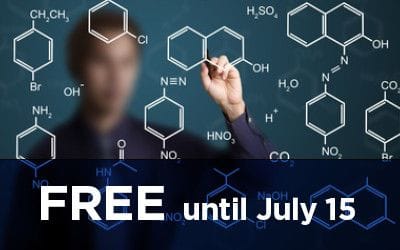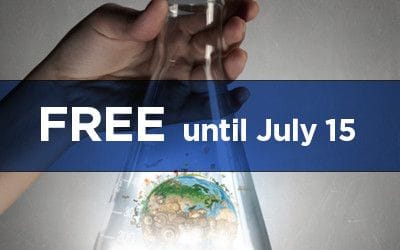ACS eBooks are great for original research, pedagogy, and career guidance.


Most people that are in any way influenced by the chemical industry have heard of ACS. It’s been around for nearly a century and a half, and it’s the world’s largest scientific society. ACS journals boast some of the most often cited research in the world, so nearly every researcher has heard of at least a few journals. However, many people overlook the vast selection of peer-reviewed eBooks that are available on the same user-friendly platform as the journals.
The ACS Symposium Series has often been confused with conference proceedings by the research and library communities. Despite including “Symposium” in the series name, these titles are often backed by substantial original research, and each chapter is written by individual authors that are experts in the subtopic. Each book comes together to fully illuminate a topic in a format that is more rich than a journal article can provide. Most chapters are as in-depth as a single journal article, with each including its own empirical data and often upward of 80 references. ACS eBooks originate from the ACS technical divisions’ symposia, which are presented at ACS national meetings. This helps broaden the content and capture a wide range of expert insights in the books. For scientists that are interested in illuminating a topic with more depth than a journal article can provide or in working with a larger group of authors, visit the book publishing webpage to find more information.

Researchers turn to ACS eBooks to find original research that provides a deeper look into topics as diverse as quantum mechanics,[1] pharmaceutical and medicinal chemistry,[2],[3],[4],[5],[6] food chemistry,[7],[8],[9],[10],[11] hydraulic fracturing,[12] nanotechnology,[13],[14],[15] women in science,[16],[17],[18],[19] and even public policy and industry leadership.[20],[21] One of the most read eBooks is a top source for detailed tabular data on azeotropes.[22]
But eBooks don’t just offer information on technical subjects. They can be an excellent source for educators interested in pedagogy and even librarians and information professionals interested in scientific data curation. Nearly as important as the research being performed itself, data management is a top priority for research institutions, and institutions are challenged across many departments to design and implement strategies for ensuing valuable data is preserved into the future—data that can even climb into the terabyte level for an individual experiment. Special Issues in Data Management examines the complexities of effective research databases and discusses the important role libraries play in facilitating these structures.[23] Other books discuss the importance of including scientific literacy in the educational environment,[24],[25],[26] which is a critical skill for science majors entering either academic or corporate research positions.

As the role of technology in society continues to increase exponentially, finding ways to encourage students to choose and complete STEM degrees [27],[28],[31],[32] grows in importance. The call to action to improve in this area has reached the highest levels in the US, as demonstrated by a report to President Barack Obama from the President’s Council of Advisors on Science and Technology.[29] This report details the economics and job market available to STEM majors as well as strategies to increase student retention in this area. The report places an emphasis on evidence-based teaching, in which thoroughly researched methods are used in the classroom.
Flipping classrooms is one method of helping students learn more effectively in introductory science classes. Significant research has been conducted [30],[31] on this topic to determine its effect both on student test scores and on student outlook before and after the chemistry course. Alongside this research has come more interest in long-term teaching trajectories [32] and meeting students’ needs, [33] and ACS has been a strong supporter in the publication world—with multiple eBooks on education as well as Journal of Chemical Education—as well as by providing funding for research in this area.[34]

In addition to a deeper look into a particular subject, eBooks can offer guidance to students and new graduates in chemistry. In order to guide students unsure about the future, educators may find it helpful to recommend the book What You Need for the First Job, Besides the Ph.D. in Chemistry,[35] which takes an in-depth look at different industries—corporations, government, and academics—so the reader can assess which skills need to be learned in the classroom and beyond. There are also eBooks that discuss diversity,[36] work–life balance,[21] entrepreneurship,[31],[37] and modernization of the workforce with respect to growing globalization. [32],[38],[39]
Overall, eBooks can contribute to learners in all segments of chemical industry, from student to teacher and researcher to librarian to policymaker, and can help professionals in different areas understand other perspectives. Tens of thousands of eBook chapters are available for readers; read one chapter to get a fresh idea or read an entire book to encourage deeper thought about one topic.
Want more information about getting access to ACS eBooks? Click here to tell us how best to connect with you.
[1] Recent Progress in Quantum Monte Carlo; Tanaka, S., Roy, P.-N.,Mitas, L., Eds.; ACS Symposium Series 1234; American Chemical Society: Washington, DC, 2016.
[2] Medicinal and Aromatic Crops: Production, Phytochemistry, and Utilization; Jeliazkov, V. D., Cantrell, C. L., Eds.; ACS Symposium Series 1218; American Chemical Society: Washington, DC, 2016.
[3] Comprehensive Accounts of Pharmaceutical Research and Development: From Discovery to Late-Stage Process Development Volume 1; Abdel-Magid, A. F., Pesti, J., Vaidyanathan, R., Eds.; ACS Symposium Series 1239; American Chemical Society: Washington, DC, 2016.
[4] Comprehensive Accounts of Pharmaceutical Research and Development: From Discovery to Late-Stage Process Development Volume 2; Abdel-Magid, A. F., Pesti, J., Vaidyanathan, R., Eds.; ACS Symposium Series 1240; American Chemical Society: Washington, DC, 2016.
[5] State-of-the-Art and Emerging Technologies for Therapeutic Monoclonal Antibody Characterization Volume 2. Biopharmaceutical Characterization: The NISTmAb Case Study; Schiel, J. E., Davis, D. L., Borisov, O. V., Eds.; ACS Symposium Series 1201; American Chemical Society: Washington, DC, 2015.
[6] State-of-the-Art and Emerging Technologies for Therapeutic Monoclonal Antibody Characterization Volume 3. Defining the Next Generation of Analytical Biophysical Techniques; Schiel, J. E., Davis, D. L., Borisov, O. V., Eds.; ACS Symposium Series 1202; American Chemical Society: Washington, DC, 2015.
[7] Browned Flavors: Analysis, Formation, and Physiology; Granvogl, M., Peterson, D., Schieberle, P., Eds.; ACS Symposium Series 1237; American Chemical Society: Washington, DC, 2016.
[8] Advances in Wine Research; Ebeler, S. B., Sacks, G., Vidal, S. Winterhalter, P., Eds.; ACS Symposium Series 1203; American Chemical Society: Washington, DC, 2015.
[9] Importance of Chirality to Flavor Compounds; Engel, K.-H., Takeoka, G., Eds.; ACS Symposium Series 1212; American Chemical Society: Washington, DC, 2015.
[10] Discovery and Synthesis of Crop Protection Products; Maienfisch, P., Stevenson, T.M., Eds.; ACS Symposium Series 1204; American Chemical Society: Washington, DC, 2015.
[11] The Chemical Sensory Informatics of Food: Measurement, Analysis, Integration; Guthrie, B., Beauchamp, J., Buettner, A., Lavine, B. K., Eds.; ACS Symposium Series 1191; American Chemical Society: Washington, DC, 2015.
[12] Hydraulic Fracturing: Environmental Issues. Drogos, D. L., Ed.; ACS Symposium Series 1216; American Chemical Society: Washington, DC, 2015.
[13] Nanotechnology: Delivering on the Promise Volume 1; Cheng, H. N., Deomeny, L., Geraci, C. L., Schmidt, D. G., Eds.; ACS Symposium Series 1220; American Chemical Society: Washington, DC, 2016.
[14] Nanomaterials for Sustainable Energy; Liu, J. L., Bashir, S., Eds.; ACS Symposium Series 1213; American Chemical Society: Washington, DC, 2015.
[15] Photoinduced Processes at Surfaces and in Nanomaterials; Kilin, D., Ed.; ACS Symposium Series 1196; American Chemical Society: Washington, DC, 2015.
[16] Are Women Achieving Equity in Chemistry? Marzabadi, C. H., Kuck, V. J., Nolan, S. A., Buckner, J. P., Eds.; ACS Symposium Series 929; American Chemical Society: Washington, DC, 2006.
[17] Successful Women in Chemistry; Hinkle, A. S., Kocsis, J. A., Eds.; ACS Symposium Series 907; American Chemical Society: Washington, DC, 2005.
[18] Mentoring Strategies To Facilitate the Advancement of Women Faculty; Karukstis, K. K., Gourley, B. L., Rossi, M., Wright, L. L., Eds.; ACS Symposium Series 1057; American Chemical Society: Washington, DC, 2010.
[19] Jobs, Collaborations, and Women Leaders in the Global Chemistry Enterprise; Cheng, H. N, Wu, M. L., Miller, B. D., Eds.; ACS Symposium Series 1195; American Chemical Society: Washington, DC, 2015.
[20] Science and the Law: How the Communication of Science Affects Policy Development in the Environment, Food, Health, and Transport Sectors; Town, W. G., Currano, J. N., Eds.; ACS Symposium Series 1207; American Chemical Society: Washington, DC, 2015.
[21] Jobs, Collaborations, and Women Leaders in the Global Chemistry Enterprise; Cheng, H. N., Wu, M. L., Miller, B. D., Eds.; ACS Symposium Series 1195; American Chemical Society: Washington, DC, 2015.
[22] Azeotropic Data—II; Horsley, L. H., Tamplin, W. S., Eds.; Advances in Chemistry 35; American Chemical Society: Washington, DC, 1962. Together with Azeotropic Data (Advances in Chemistry 6, 1952) and Azeotropic Data—III (Advances in Chemistry 116, 1973), these books make up a comprehensive listing of azeotropic data and prediction methods.
[23] Special Issues in Data Management; Xiao, N., McEwen, L. R., Eds.; ACS Symposium Series 1110; American Chemical Society: Washington, DC, 2012. For a limited time, read a chapter from this book for free.
[24] Integrating Information Literacy into the Chemistry Curriculum; Lovitt, C. F., Shuyler, K., Li, Y., Eds.; ACS Symposium Series 1232; American Chemical Society: Washington, DC, 2016.
[25] The Future of the History of Chemical Information; McEwen, L. R., Buntrock, R. E., Eds.; ACS Symposium Series 1164; American Chemical Society: Washington, DC, 2014.
[26] Currano, J. N. Maintaining a Sustainable Scholarly Record. In Teaching and Learning about Sustainability; Levy, I. J., Middlecamp, C. H., Eds.; ACS Symposium Series 1205; American Chemical Society: Washington, DC, 2015.
[27] Early Research: A Strategy for Inclusion and Student Success; Murray, D. H., Obare, S. O., Hageman, J. H., Eds.; ACS Symposium Series 1231; American Chemical Society: Washington, DC, 2016.
[28] Addressing the Millennial Student in Undergraduate Chemistry; Potts, G. E., Dockery, C. R., Eds.; ACS Symposium Series 1180; American Chemical Society: Washington, DC, 2014.
[29] President’s Council of Advisors on Science and Technology. Report to the President. Engage to Excel: Producing One Million Additional College Graduates with Degrees in Science, Technology, Engineering, and Mathematics; Executive Office of the President: Washington, DC, 2012.
[30] The Flipped Classroom Volume 1: Background and Challenges; Muzyka, J. L., Luker, C. S., Eds.; ACS Symposium Series 1223; American Chemical Society: Washington, DC, 2016. For a limited time, read a chapter from this book for free.
[31] The Flipped Classroom Volume 2: Results from Practice; Muzyka, J. L., Luker, C. S., Eds.; ACS Symposium Series 1228; American Chemical Society: Washington, DC, 2016.
[32] Trajectories of Chemistry Education Innovation and Reform; Holme, T., Cooper, M. M, Varma-Nelson, P., Eds.; ACS Symposium Series 1145; American Chemical Society: Washington, DC, 2013.
[33] The Promise of Chemical Education: Addressing our Students’ Needs; Daus, K., Rigsby, R., Eds.; ACS Symposium Series 1193; American Chemical Society: Washington, DC, 2015.
[34] ACS has been providing awards for excellence in research for improved teaching and learning of chemistry since 2007. Find out more about the ACS Award for Achievement in Research for the Teaching and Learning of Chemistry and about the ACS–Hach Professional Development Grant.
[35] What You Need for the First Job, Besides the Ph.D. in Chemistry; Benvenuto, M. A., Ed.; ACS Symposium Series 1165; American Chemical Society: Washington, DC, 2014. For a limited time, read a chapter from this book for free.
[36] Careers, Entrepreneurship, and Diversity: Challenges and Opportunities in the Global Chemistry Enterprise; Cheng, H. N., Shah, S., Wu, M. L., Eds.; ACS Symposium Series 1169; American Chemical Society: Washington, DC, 2014.
[37] Chemistry without Borders: Careers, Research, and Entrepreneurship; Cheng, H. N., Rimando, A. M., Miller, B. D., Schmidt, D. G., Eds.; ACS Symposium Series 1219; American Chemical Society: Washington, DC, 2016.
[38] Vision 2025: How To Succeed in the Global Chemistry Enterprise; Cheng, H. N., Shah, S., Wu, M. L., Eds., ACS Symposium Series 1195; American Chemical Society: Washington, DC, 2014. For a limited time, read a chapter from this book for free.
[39] Chemistry as a Second Language: Chemical Education in a Globalized Society; Lovitt, C. F., Kelter, P., Eds.; ACS Symposium Series 1049; American Chemical Society: Washington, DC, 2010.